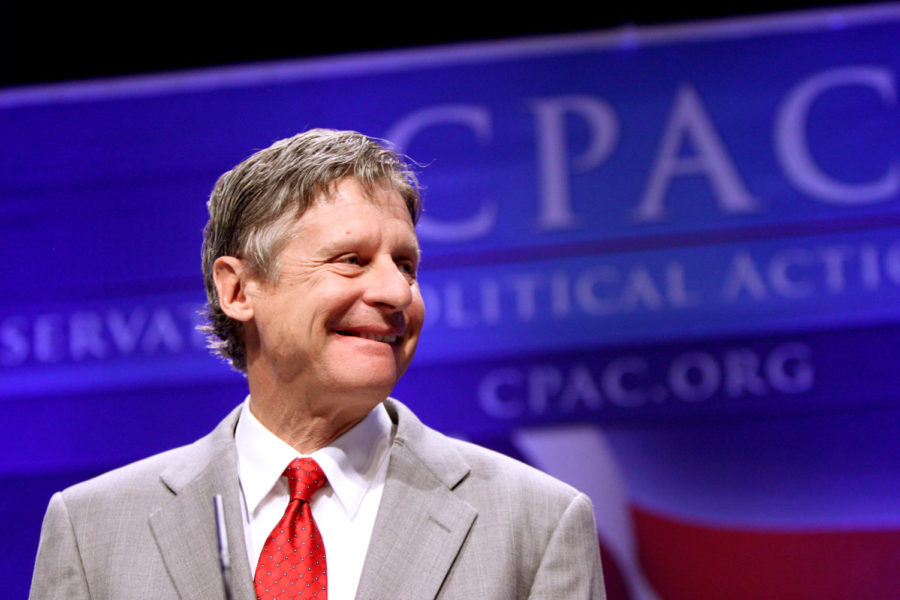Stoffa: Obama, Romney not only option for president, third party candidates offer alternatives
Photo courtesy of Flickr/Gage Skidmore
Opinion: Stoffa 9/7
September 4, 2012
On Nov. 6, millions will flock to voting booths to cast their vote for president. Many folks will vote Republican or Democrat based on their particular political leanings, while some will vote Mickey Mouse or Yoda out of spite or just for fun.
There is another option that will be available on at least one state’s ballot, Iowa, that of Libertarian candidate Gov. Gary Johnson.
Third party candidates are nothing new; Ross Perot ran in 1992 and 1996. During campaigning, he sometimes polled ahead of both George H. W. Bush and Bill Clinton, though he ended with less than 10 percent of all votes come election day.
This election, as Barack Obama and Mitt Romney bash each other in ads and speeches, Johnson is a legitimate factor. Not as a likely possibility to win the presidency — there are too many people still unaware of him — but as someone who might sway a given state to one side or the other by taking away votes that might have been cast for the main two parties.
Open and free elections should have more than two options. Johnson’s platform offers ideas from all sides and different ideas as to how to better serve America.
But rather than embracing the influence a third party might offer, there is often an effort to eliminate the public from wanting to vote for the non-mainstream option.
Johnson is currently seen as a larger threat to the already precarious Republican vote, due partly to the recent slights to Ron Paul’s Republican supporters at the Republican National Convention. The National Convention refused to seat the delegates from Maine, as well as refused to announce Paul’s name and the number of votes he received from a given state. As a result, many supporters said they would vote third party now come election day, rather than cast their vote for Romney.
Likely stemming from this threat, Jay Kramer, a Romney campaign supporter from Washington, filed a challenge Friday to prevent Johnson from inclusion on the Iowa ballot. The signatures necessary to include Johnson were gathered at the Iowa State Fair. Kramer’s claim states those signatures were not all from Libertarians and should be thrown out.
On Monday, Matt Schultz, Republican secretary of State; Tom Miller, Democratic attorney general; and Warren Jenkins, chief deputy for Republican Auditor David Vaudt all voted unanimously to include Johnson on the Iowa ballot.
Republicans aren’t the only party to employ tactics to get rid of potential problems. President Barack Obama used election rules to rid himself of competition when he first campaigned during 1996 for a state Senate seat.
In 2008, Obama sought to prevent the seating of Florida and Michigan delegates at the Democratic National Committee because their primaries were early. In Florida, 50 percent of the vote went to Hillary Clinton, Obama’s leading competition at the time, compared to his 33 percent, and Clinton won 55 percent of the vote in Michigan, where Obama was not even listed on the ballot.
Tactics like those are legal because there is so much paperwork involved in becoming a nominee for office. When politicians run, they want to win, and anyone who stands in their way should be cautious.
Alicia Dearn, Johnson’s campaign attorney, claims similar legal maneuvers are underway by the Romney campaign to keep Johnson off the ballot in Michigan and Pennsylvania, with more attempts possible.
With any luck, Johnson will be included on the ballots for all 50 states.
Take a look at what Johnson has to offer. Maybe you like it, maybe you don’t, but don’t ignore him simply because he doesn’t have access to the millions and millions of dollars being tossed around by the Republican and Democrat parties and Super PACs.
He is a real candidate with a legitimate following and deserves to be heard in the debates and seen on the ballots. There are enough people supporting Johnson to change the electoral votes for a state.
Partisan politics should be cast aside to allow more options in free elections. Decisions don’t have to be strictly left or right; there is always another path.
Correction: At the time of publication, the “H.” in George H. W. Bush’s name was left out. It has been added for clarification.

















